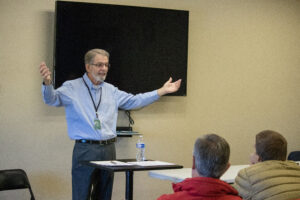
OKLAHOMA CITY, Okla. (BP) — A Catholic church’s proposal to open the first publicly funded religious charter school in the nation was rejected Tuesday (Apr. 11) in Oklahoma in a case that could impact the separation of church and state.
Oklahoma’s Statewide Virtual Charter School Board unanimously rejected the application from the Archdiocese of Oklahoma City and the Roman Catholic Diocese of Tulsa to establish St. Isidore of Seville Catholic Virtual School (SISCVS), named after the Catholic patron saint of the internet. The church, which has indicated a desire for the case to serve as a test before the U.S. Supreme Court, has a month to revise its application to the board for reconsideration.
The school would be “a fully Catholic school,” the Archdiocese of Oklahoma has said, and would follow a curriculum approved by the Catholic church. SISCVS, proposed to eventually serve up to 1,500 kindergarteners through high schoolers, would be the first religious charter school in the nation. The school could cost taxpayers $25.7 million, Reuters reported.
The legality of such a school is in question. While Oklahoma’s constitution bans the use of public funds for charter schools, John O’Connor, Oklahoma’s immediate past attorney general, said in December 2022 that the state’s ban could be a violation of the U.S. Constitution.
But Oklahoma’s new attorney general, Gentner Drummond, withdrew O’Connor’s decision in February, saying O’Connor erred in basing his opinion on court decisions regarding private schools, not charter schools which are by definition publicly funded independent schools.
“As a strong supporter of religious liberty, I am obliged to note that the Opinion does nothing to advance that worthy cause,” Drummond wrote in withdrawing O’Connor’s opinion. “Religious liberty is one of our most fundamental freedoms. It allows us to worship according to our faith, and to be free from any duty that may conflict with our faith. The Opinion, as issued by my predecessor, misuses the concept of religious liberty by employing it as a means to justify state-funded religion. If allowed to remain in force, I fear the Opinion will be used as a basis for taxpayer-funded religious schools, which is precisely what SISCVS seeks to become.”
The approval of the archdiocese’s application, Drummond said, would set a dangerous precedent.
“While many Oklahomans undoubtedly support charter schools sponsored by various Christian faiths,” Drummond said, “the precedent created by approval of the SISCVS application will compel approval of similar applications by all faiths. I doubt most Oklahomans would want their tax dollars to fund a religious school whose tenets are diametrically opposed to their own faith. Unfortunately, the approval of a charter school by one faith will compel the approval of charter schools by all faiths.”
SISCVS would be designed to serve rural students across the state without the cost of private tuition. The University of Notre Dame in Indiana aided the archdiocese in drafting the application, which had cited Trinity Lutheran Church of Columbia, Inc. v. Comer, Espinoza v. Montana Department of Revenue and Carson v. Makin.
In comments before the board at its April 11 meeting, members of the public opposed the charter school as a violation of the Establishment Clause of the U.S. Constitution. But the board said its rejection of the application was not a ruling on the school’s legality but rather was based on the application itself, Reuters reported. The board submitted several questions to the archdiocese for clarification.
The question of whether charter schools are state actors bound by constitutional limitations on governmental bodies has yet to be decided, Drummond said, indicating that the case of Peltier v. Charter Day School, Inc., filed in September 2022, will give the High Court a chance to settle the question.
The case involves a North Carolina charter school that receives 95 percent of its funding from the government, but forces girls to wear skirts, asserting that Title 9 barring gender discrimination does not apply to charter schools.
“I am hopeful that the U.S. Supreme Court will definitively rule on this unsettled issue next term,” Drummond wrote.















